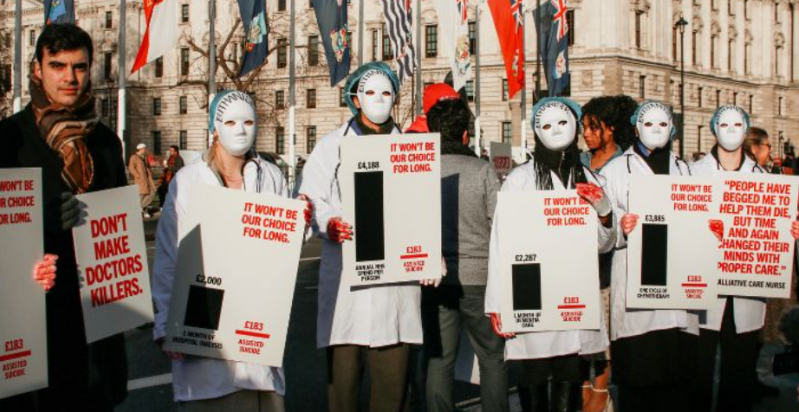
Campaigners including Christians and other religious groups, humanists, medics, and disability groupsgathered outside the Houses of Parliament in London on May 16 to protest against an Assisted Dying Bill that was tensely debated by lawmakers.
The Terminally Ill (Adults) Bill legislation, devised by Labour MP Kim Leadbeater and approved in December 2024, will allow "adults who are terminally ill, subject to safeguards and protections, to request and be provided with assistance to end their own life” for those with a life expectancy of no more than six months.
The bill has been reviewed by 23 MPs in a cross-party committee with a number of amendments made and a vote on whether to pass the planned law in its current form is expected by June 13.
The amended legislation returned to the House of Commons where changes under discussion have reportedly included allowing medical staff to opt out of helping a patient die. Another amendment, as previously reported by Christian Daily International, was that the original bill pledged that assisted dying would only be allowed following signed permission from a high court judge and two doctors.
However, writing an op-ed on Feb. 10 for the left-leaning British newspaper The Guardian, titled "I’m changing my bill to ensure people have a dignified death - here’s how," Leadbeater revealed that she had received advice from a "wide range of witnesses," including lawyers and medical experts, all of whom supported an alternative of introducing a "multidisciplinary layer of protection."
“I’ll be proposing an amendment to create a voluntary assisted dying commission,” she wrote at the time. “It would be chaired by a high court judge or a former senior judge, thus retaining the judicial element in my bill.
"The commission would then authorize expert panels to look at every application for an assisted death. Those panels would have a legal chair, but also include a psychiatrist and a social worker, who will bring their own expertise in assessing mental capacity and identifying any risk of coercion. In short, I’m proposing what could be termed ‘Judge Plus.’"
Meanwhile, Christian Concern sent a press release before the parliamentary debate, saying several campaign groups would gather outside to voice their opposition to the law.
The Royal College of Psychiatrists is one of the groups expressing concern and it has stated it “cannot support the Terminally Ill Adults (End of Life) Bill for England and Wales in its current form.” The college cited concerns on the “possible impacts of the passing of legislation in the UK and Crown Dependencies on those with mental illness, intellectual disabilities and neurodevelopmental conditions; implications for the psychiatric profession should proposals be implemented; and the reliability of consent procedures.”
According to Christian Concern, the government’s own impact assessment of the planned law “showed that there is increasing uncertainty around how the Bill will work in practice and raised questions about the workability of the Bill given high levels of expected opt outs from NHS [National Health Service] professionals.”
People with mental health conditions, pregnant mothers and those with diabilities would not be excluded from accessing suicide services, stated Christian Concern, under the assessment.
“If this bill becomes law, all eligible patients will automatically be entitled to assistance to end their lives while not all of those patients will have access to good palliative care,” stated Christian Concern.
“Doctors will be allowed to raise assisted suicide with a patient multiple times without any request from the patient. There are serious risks of pressure, coercion and abuse.
“There are mounting concerns about this Bill in both parliament and across society. Disabled people in particular are very concerned about pressure to end their lives.”
Nikki and Merv Kenward, who are part of the campaign group, Distant Voices, were planning to attend the protest rally outside parliament.
Nikki was diagnosed with Guillain-Barré Syndrome virus leaving her immune system vulnerable to attacks from the nervous system. She can only blink one eye and told Christian Concern that she found herself locked into her own body and admits that at times her life seemed unbearable.
"If you'd asked me then, I would have said I'd rather not live. Just one of my eyes would open and I think if my family had been asked by the hospital they'd have opted to end my life. I hadn't seen my son for months and the thought of him being without me broke my heart more than what was happening to me."
Nikki said that she had been glad to have carried on living and seen her son grow up and get married.
"I believe that suicide is not the answer, the answer is to be cared for with absolutely brilliant, palliative care”, she said.






